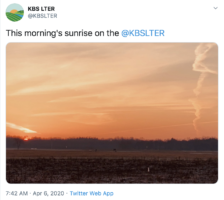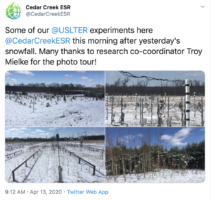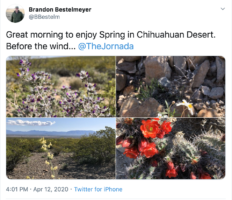
April 2020
LTER Network News is a forum for sharing news and activities from across the LTER Network. This is our water cooler. If you have personnel changes, new grants, or cross-Network activities that might interest your LTER colleagues, please send them along to weiss@nceas.ucsb.edu.
Announcements
This Friday, April 24 at 10 am PT the LTER Network Office is hosting its first Virtual Career Panel webinar featuring panelists from NGOs and government agencies. We invite LTER graduate and REU students and other early career researchers interested in learning about non-academic careers to join in. Two more panels are planned for May and June, featuring data scientists, communicators, science policy specialists, and more.
A highlight of the annual LTER Science Council meeting is a series of 5-minute talks from each site. Together, they provide a condensed survey of the wide variety of science that LTER investigators are pursuing. We had to move the Science Council meeting online this year, which was a disappointment, but it also allows us to open those talks up to a broader audience. Please join us for LTER site talks: May 5, 6, and 7, 2020 at 10 am – Noon PT. Register here: Webinar Registration – Zoom
The LTER Network Office collaborated on a blog published this month in ESA’s Ecotone, titled Ecology and COVID-19 #1: To go or not to go (in the field)? We hope it provides a bit of guidance and perspective for those LTER researchers having to make hard decisions about whether to continue fieldwork during the covid-19 pandemic.
The LNO is also curating a list of LTER-related virtual resources for educators, parents, and students to aid in online learning. If your site has an education resource you’d like us to add to this webpage, please email weiss@nceas.ucsb.edu.
Around the Network
Congratulations to the LTER researchers named as Ecological Society of America Fellows for 2020! New fellows include Serita Frey and Gary Lovett (Hubbard Brook LTER), Lauren Hallett (Niwot Ridge LTER), Meghan Avolio (Konza Prairie LTER), and Knute Nadelhoffer (Harvard Forest, Arctic LTERs).
Congratulations to Lydia Zeglin of Konza Prairie LTER who received an NSF CAREER award to measure interactions between prairie grazers and soil microbes, and to Catalina Segura of Andrews Forest LTER who received a CAREER award to support her research on the temporal-spatial variability of rainfall-runoff generation in headwater streams.
Congratulations as well to the many graduate students across LTER sites awarded NSF Graduate Research Fellowships. We are so proud of our graduate student community!
Save the Dates
Reproducible Research Techniques for Synthesis – Taught in partnership with DataONE, this five-day immersion into widely adopted R-based tools for open science will help participants stay abreast of current best practices and initiatives and begin acquiring data science skills to maximize productivity, share data with the scientific community, and benefit from the re-use of their data by others. August 17-21, 2020.
Data Science Training for Arctic Researchers – Applications are due April 24th for this 5-day all-expenses paid workshop provided by the Arctic Data Center. The October workshop will provide an overview of best data management practices, data science tools and concrete steps and methods for more easily documenting and uploading data to the Arctic Data Center.
Recent Press
From the National Science Foundation
Other media
- How COVID-19 could ruin weather forecasts and climate records | Nature News
- Field research, interrupted: How the COVID-19 crisis is stalling science | MongaBay
- From Research In Hyperspeed To Canceled Expeditions, Academic Scientists Adjust To A New Pace Under Coronavirus | CPR News
- Prairie Research Could Help Farming Become More Resilient, Sustainable | Iowa Public Radio
- How Scientists Are Keeping Irreplaceable Research Going During the COVID-19 Pandemic | Smithsonian
- Higher CO2 levels make plants less nutritious and hurt insect populations | GreenBiz
- Researcher discovers method for detecting tiny ocean organisms | Delta Wind
Papers of Interest
The most recent LTER-related papers are available on the LTER Network web site and the full Network bibliography is available at the LTER Network Zotero Group Library. Listed here is just a small sampling of the 30-40 LTER related papers that are published each month.
- Nutrient dilution and climate cycles underlie declines in a dominant insect herbivore | PNAS
- How farmers “repair” the industrial agricultural system | Agriculture and Human Values
- Do Neighborhood Walkability, Transit, and Parks Relate to Residents’ Life Satisfaction? | Journal of the American Planning Association
- Patterns and Drivers of Carbon Dioxide Concentrations in Aquatic Ecosystems of the Arctic Coastal Tundra | Global Biogeochemical Cycles
- When the rainforest dries: Drought effects on a montane tropical stream ecosystem in Puerto Rico | Freshwater Science
- GIS tool to predict photosynthetically active radiation in a Dry Valley | Antarctic Science
- Nowhere to swim: interspecific responses of prairie stream fishes in isolated pools during severe drought | Aquatic Sciences
- Deciphering the past to inform the future: preparing for the next (“really big”) extreme event | Frontiers in Ecology and the Environment
- Contrasting effects of plant diversity on β‐ and γ‐diversity of grassland invertebrates | Ecology
- Long‐term research avoids spurious and misleading trends in sustainability attributes of no‐till | Global Change Biology
Funding Opportunities
- NSF Signals in the Soil (SitS). This program encourages convergent research that transforms existing capabilities in understanding dynamic soil processes, including soil formation, through advances in sensor systems and modeling, Full proposals due: May 20, 2020
- Navigating the New Arctic Community Office (NNA-CO). An NNA community office is required to coordinate the activities of funded NNA projects; engage new PIs; and promote research, education, and outreach activities. Proposals due: July 10, 2020.
- NSF INCLUDES Planning Grants Solicitation (19-600). These grants support planning efforts necessary to build capacity to establish future centers, alliances, or other large-scale networks endeavoring to address a broadening participation challenge in STEM at scale. Proposals due: July 13, 2020.
- Research Experiences for Undergraduates (REU). The Research Experiences for Undergraduates (REU) program supports active research participation by undergraduate students in any of the areas of research funded by the National Science Foundation. REU projects involve students in meaningful ways in ongoing research programs or in research projects specifically designed for the REU program. Proposals due: August 26, 2020.
- International Research Experiences for Students (IRES). This program supports international research and research-related activities for U.S. science and engineering students. IRES focuses on active research participation by undergraduate or graduate students in high quality international research, education and professional development experiences in NSF-funded research areas. Proposals due: Track I, IRES Sites: September 8, 2020; Track-II, Advanced Studies Institutes: September 15, 2020; Track – III, New Concepts in International Graduate Experience: September 22, 2020.
Jobs and Fellowships
- Lead Limnology Technician | Niwot Ridge LTER, University of Colorado
- Post-Doctoral Researcher (2 positions) | Coastal and Estuarine Ecology Lab, Virginia Institute of Marine Science
- NEON Postdoctoral Fellows | Boulder, CO
Twitter Pics of the Month













